Remco Evenepoel secures historic Olympic double with road race victory
The Belgian added road race glory to his time trial victory from one week ago
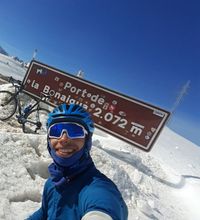
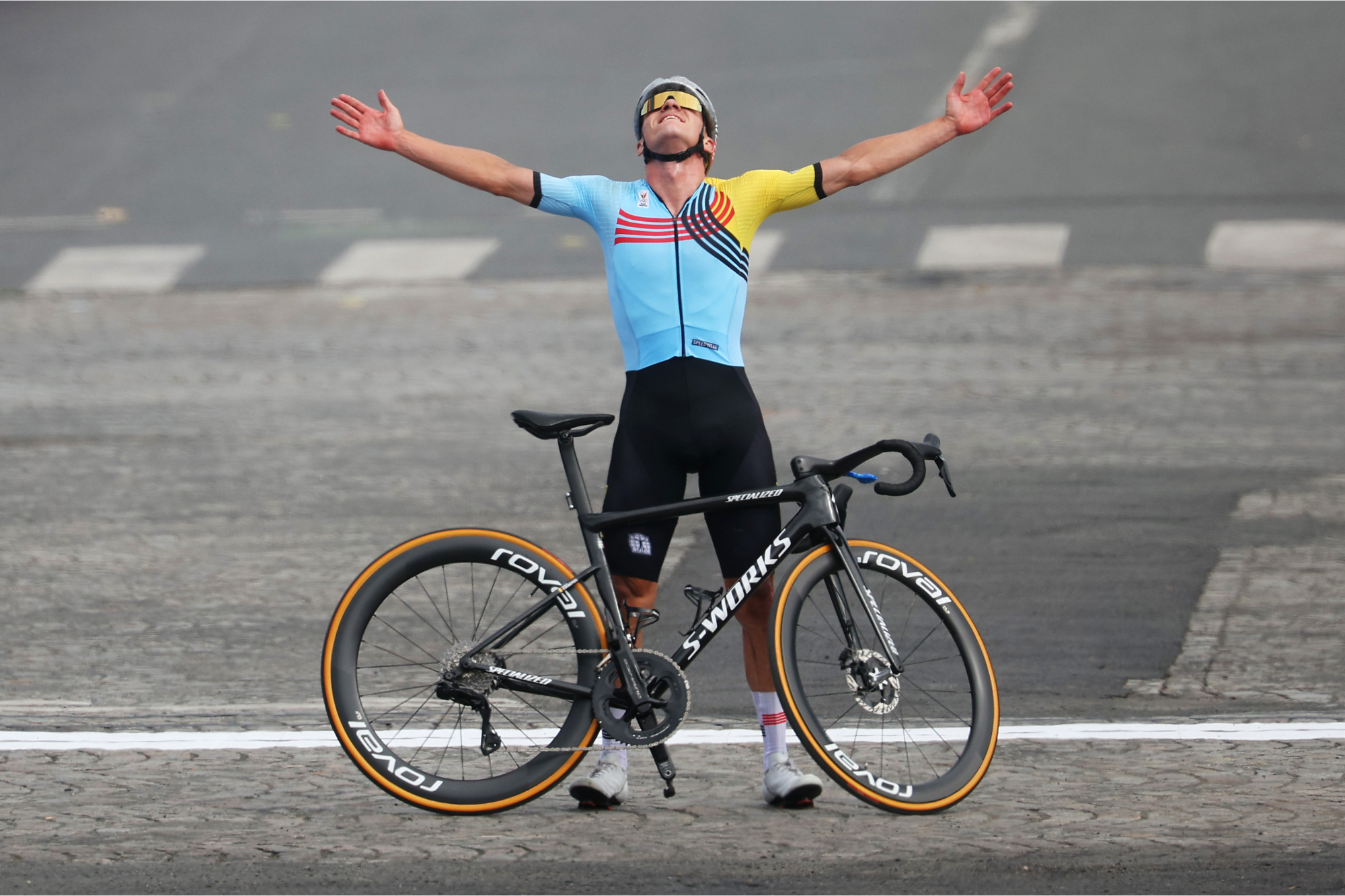
The latest race content, interviews, features, reviews and expert buying guides, direct to your inbox!
You are now subscribed
Your newsletter sign-up was successful
Remco Evenepoel attacked in the final 15km to win the men's Olympic road race at Paris 2024 by more than a minute, the Belgian securing a historic double having won the time trial just a week prior.
The 24-year-old was one of four pre-race favourites and he came good on that tag with a ride that was full of explosive attacks, although the two-time world champion did suffer a back wheel puncture with 4km to go.
Valentin Madouas and Christophe Laporte finished second and third, meaning that France won both silver and bronze medals in their home Games.
Victory for Evenepoel means that he becomes the first ever man to win both the road race and time trial in the same Olympics Games, and the first rider since Netherlands' Leontien Zijlaard-van Moorsel in 2000 to claim the double.
"I mean, look at that," Evenepoel said afterwards, pointing to the Eiffel Tower that denoted the finish line. "What a place to win this. I feel so proud to win this and to be the first ever to take the double. It's history, no?"
"Honestly, I feel sick from the effort," he added. "It was a pretty hard day out there. Especially with that stressy moment with four kilometres to go with the puncture: I had to change bike, the car wasn't ready for that moment, it was a bit stressy, but I had enough time. Ah, what a day."
How it unfolded
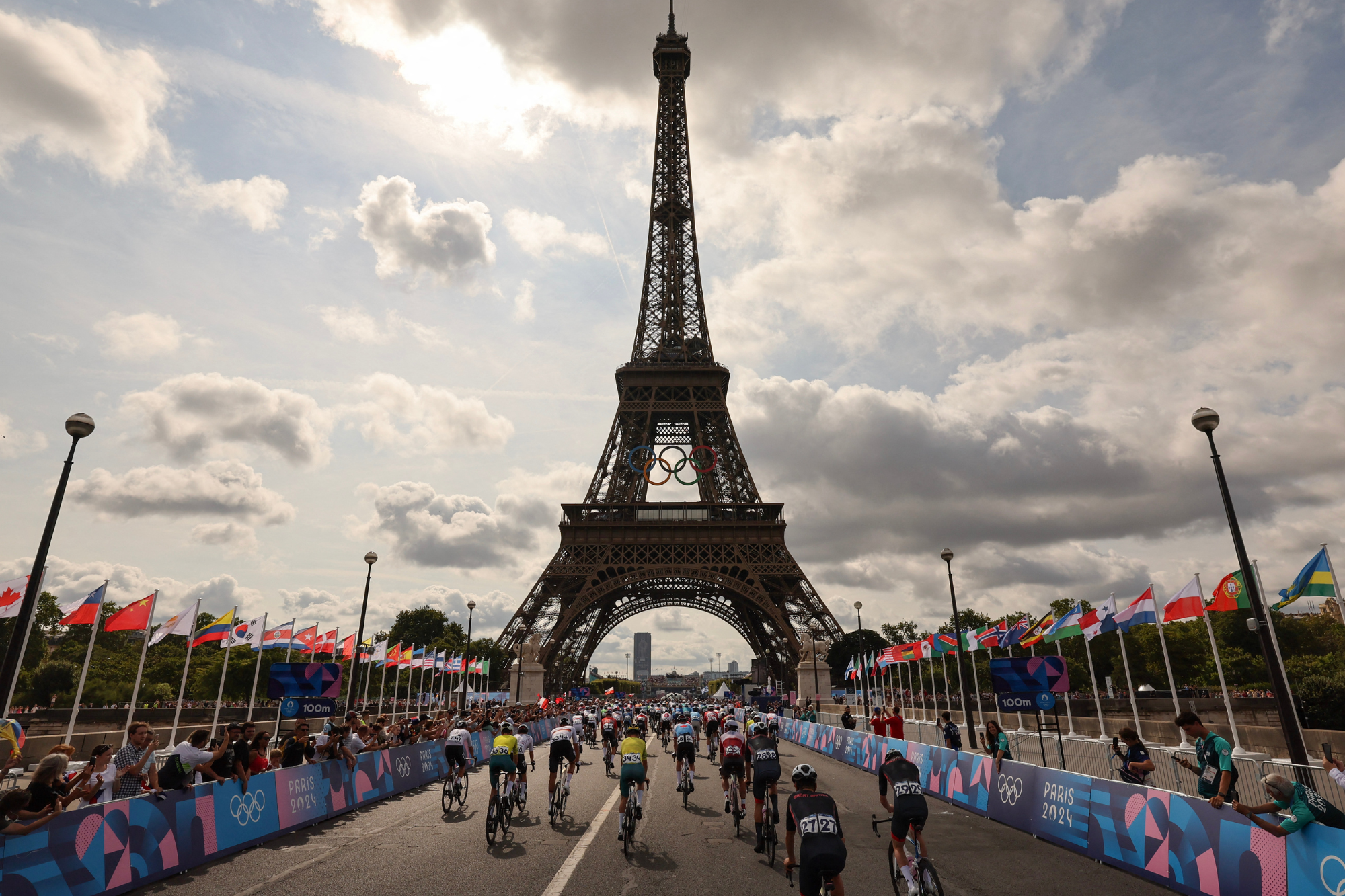
Starting mid-morning under the Eiffel Tower, the first Olympic Games on European soil since London 2012 was noticeably different to almost all other races for myriad of reasons: ran over 272.1km, the longest ever Olympic road race, the peloton was half the size with 90 riders, and the biggest teams only counted four men; there were no team radios; and the reigning champion, Richard Carapaz of Ecuador, wasn’t selected to defend his title.
The latest race content, interviews, features, reviews and expert buying guides, direct to your inbox!
The break that formed immediately consisted of riders unbeknown to many: Eric Manizabayo (Rwanda), Thanakhan Chaiyasombat (Thailand), Christopher Rougier-Lagane (Mauritius), Charles Kagimu (Uganda) and Achraf Ed Doghmy (Morocco). With such a mammoth distance to cover, the quintet were permitted an enormous lead of almost 15 minutes before the peloton started to reel them in.
After two hours of racing, however, a small group of four did clip off the front of the peloton in preparation for a later tactical move, it comprised of Ryan Mullen (Ireland), Elia Viviani (Italy), Gleb Syritsa (Individual Neutral Athletes) and Georgios Bouglas (Greece). The quartet caught up to the remnants of the original break with 120km remaining, the point in the day when the race began stirring into life with five climbs to be completed in a 20km stretch before the peloton entered the finishing circuit in Paris.
Successive attacks came, most notably from Ben Healy (Ireland) and Alexey Lutsenko (Kazakhstan) who attacked from a chase group that had just formed with Derek Gee (Canada) and Rui Costa (Portugal). At the 75km mark, Ireland’s Healy and Mullen were the leaders of the race alongside Lutsenko with a lead of 20 seconds, the trio having cleverly got themselves free before the inevitable chaos ensued behind.
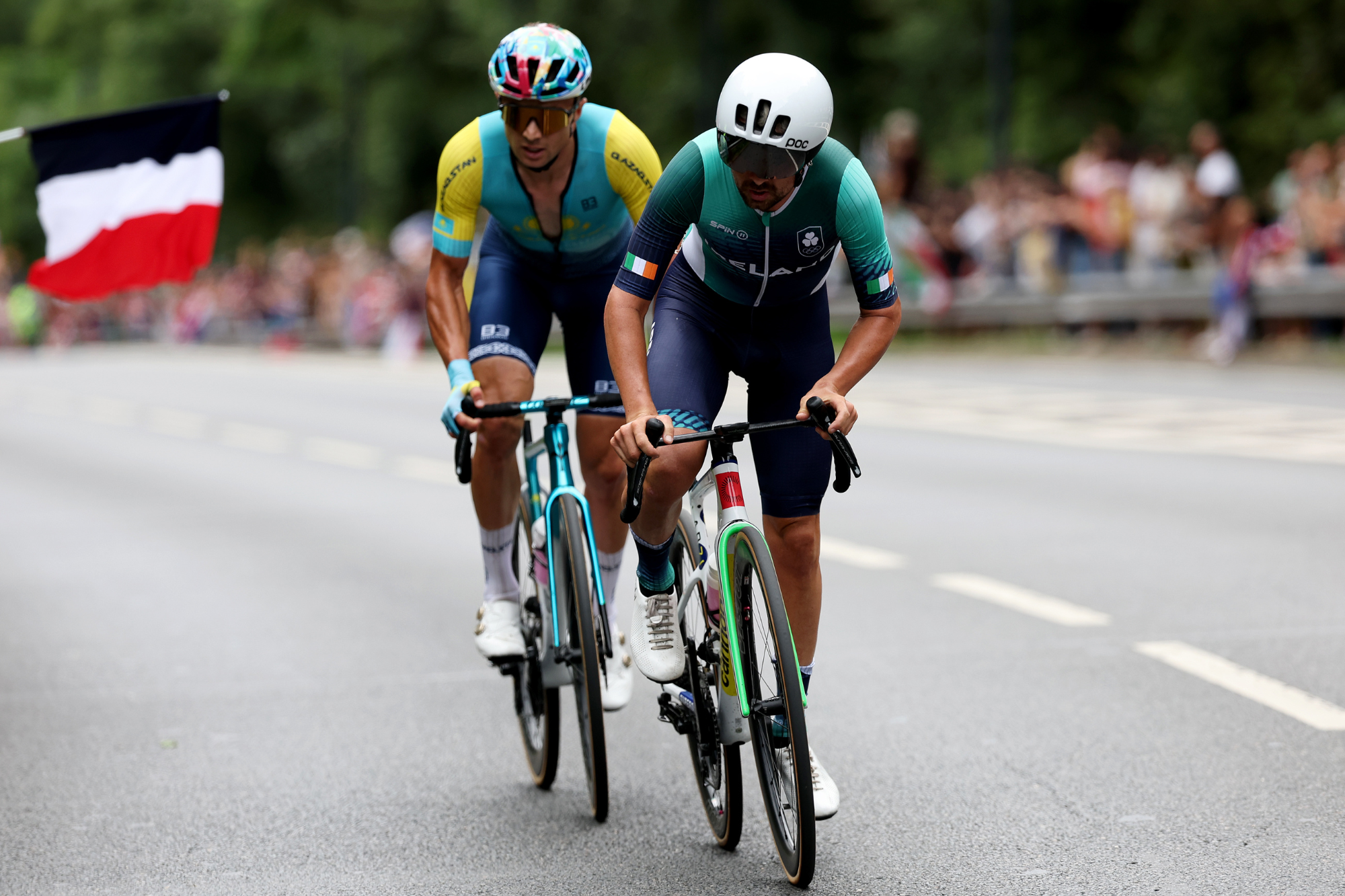
Ben Healy and Alexey Lutsenko off the front of the peloton
Evenepoel tried four times in 15 kilometres to force a move, but none of his moves intended to create a small group stuck, the Belgian expressing his frustration with the lack of cooperation. At 60km to go, a key moment: Doman Novak (Slovakia), Nils Politt (Germany), Michael Woods (Canada), Valentin Madouas (France) attacked in unison, and were shortly joined by Fred Wright (Great Britain), Stefan Küng (Switzerland) and Jambaljamts Sainbayar (Mongolia). The seven riders, 20 seconds adrift of the Healy-Lutsenko duo, had a minute on the peloton that was pushing hard, with the teams of the three favourites, Netherlands, Denmark and Belgium, all noticeably absent in the two groups up the road.
As the riders turned onto the Montmartre for the first of three times, a 1.1km cobbled climb averaging 5.9%, drama: first, Healy distanced Lutsenko to be the sole leader of the race; then, behind, Van der Poel sprung out of the peloton with his trademark explosivity, and only Van Aert was able to react. When the cyclocross pair made it to the top of the hill that is dominated by the Sacré-Cœur Basilica, they were joined by Matteo Jorgenson (USA), Julian Alaphilippe (France) and Toms Skujinš (Latvia).
The group of five, however, failed to capitalise on their 20 second lead to the peloton, allowing Mads Pedersen (Denmark), who had suffered an untimely puncture just before the Montmartre, to join them along with Tom Pidcock (Great Britain). Evenepoel then went into time trial mode to bridge the gap, swelling the chasing group even more; curiously, though, Van der Poel’s group sat up.
A few kilometres later, Healy’s time at the front came to an end, a viscous in-the-saddle attack from Evenepoel on an uncategorised climb bringing the Irishman back into the fold and reducing the chase group to those two, Madouas, Küng and Marco Haller (Austria).
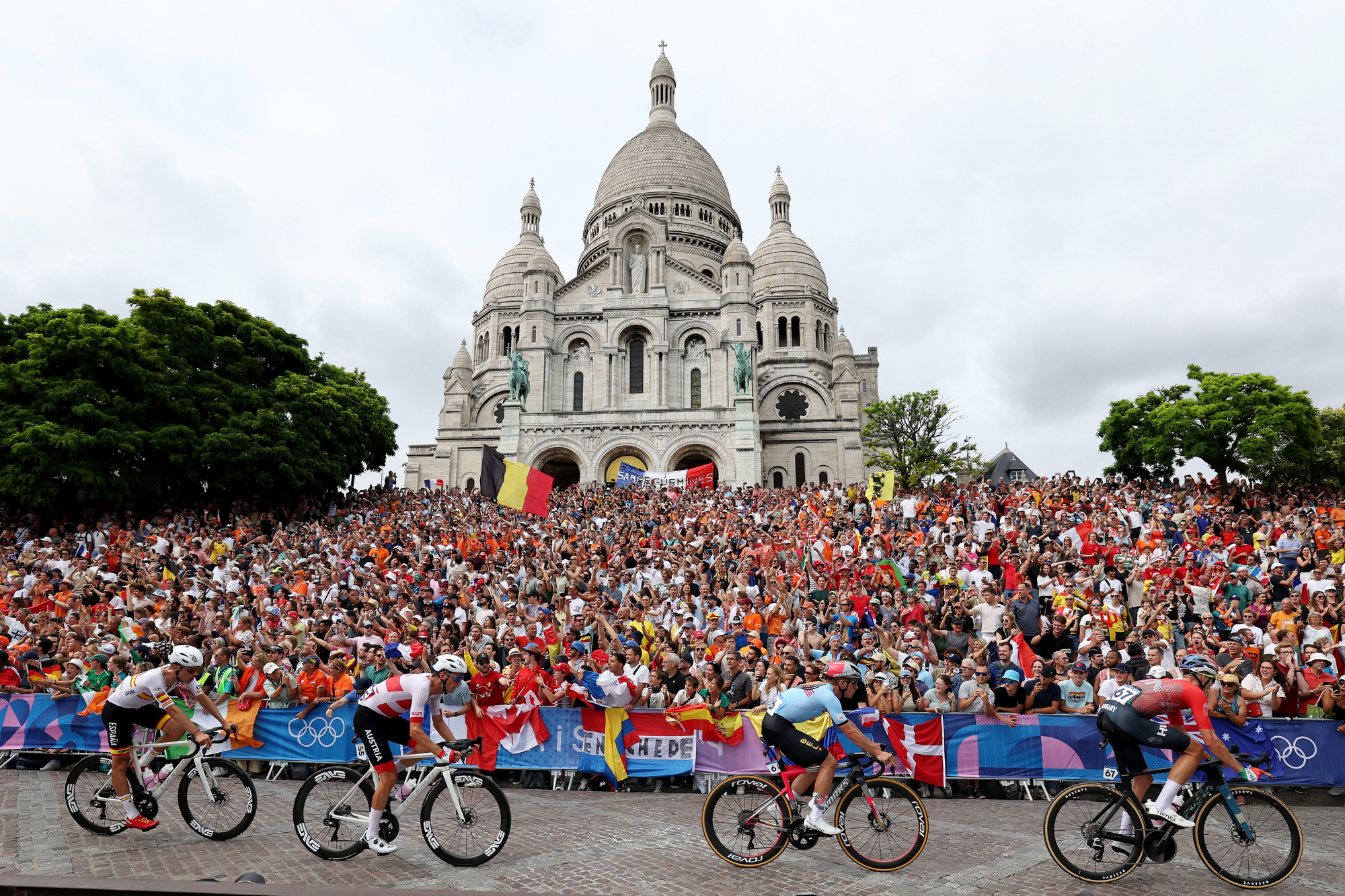
Evenepoel and the lead group passing the Sacré-Cœur Basilica
The second time up the Montmartre then shook things up even more: Evenepoel and Madouas shackled the other three from their leading group, while Van der Poel and Van Aert attacked on the climb, but still they had a deficit of 40 seconds to the two leaders. At the bottom, the duo had Pedersen, Jorgenson, Alaphilippe, Christophe Laporte (France), and Michael Matthews (Australia) for company.
With 20km to go, Madouas was struggling to stay with Evenepoel, but the duo had 55 seconds on the chase group with just one final climb to go. Behind, uncooperative chase groups waited and sat up, playing into the hands of the pair up the road. Five kilometres after and Evenepoel made his decisive move, turning the screw on the penultimate climb of the race and just riding away from a fatigued Madouas and towards a historic Olympic double.
A back wheel puncture with 3.8km to go briefly threatened to derail Evenepoel, but a quick bike change settled his nerves, ensuring that he became the second Belgian in three editions win the road race, following in the wheel tracks of Greg Van Avermaet in 2016. As he did so, Evenepoel got off his spare bike and posed on the finish line in front of the famous Eiffel Tower.
Behind, Madouas held on for second place, his best ever result, and Laporte won a small sprint for third place to ensure the hosts had two men on the final podium. But the day, and the road events at Paris 2024, belonged firmly to Remco Evenepoel.
Result: Men's Olympic road race: Paris > Paris, 272.1km
1. Remco Evenepoel (Bel) in 6:19.34
2. Valentin Madouas (Fra), at 1:11
3. Christophe Laporte (Fra), at 1:16
4. Attila Valter (Hun)
5. Toms Skujinš (Lat)
6. Marco Haller (Ast)
7. Stefan Küng (Swi)
8. Jan Tratnik (Slo)
9. Matteo Jorgenson (USA), all at same time
10. Ben Healy (Irl), at 1:20
A freelance sports journalist and podcaster, you'll mostly find Chris's byline attached to news scoops, profile interviews and long reads across a variety of different publications. He has been writing regularly for Cycling Weekly since 2013. In 2024 he released a seven-part podcast documentary, Ghost in the Machine, about motor doping in cycling.
Previously a ski, hiking and cycling guide in the Canadian Rockies and Spanish Pyrenees, he almost certainly holds the record for the most number of interviews conducted from snowy mountains. He lives in Valencia, Spain.
